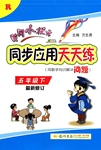题目内容
She to have lunch with her friend, saying that she wasn’t feeling well.
A. declined B. resigned C. tended D. approved
A

练习册系列答案
 黄冈小状元同步计算天天练系列答案
黄冈小状元同步计算天天练系列答案
相关题目
题目内容
She to have lunch with her friend, saying that she wasn’t feeling well.
A. declined B. resigned C. tended D. approved

 黄冈小状元同步计算天天练系列答案
黄冈小状元同步计算天天练系列答案